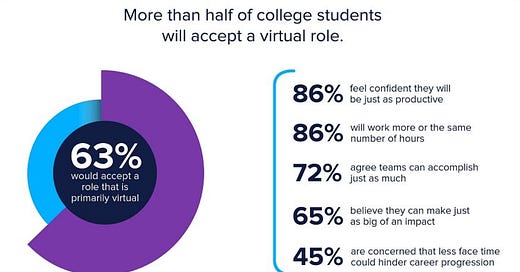The other day, I saw a call out for story sources on Help a Reporter (HARO). It was for “young entrepreneurs” and I was intrigued. I was a perfect fit for the story, only to see at the end: “No millennials please!”
I was gutted. Apparently, as a millennial, I am no longer a ‘young entrepreneur.’ Just an entrepreneur, I suppose.

So since my generation is both no longer the focus (and apparently the cause of all that’s wrong in the world? Or something), let’s talk about Gen Z and remote work for a minute.
There’s a new study on how Gen Z folks feel about remote work. So let’s talk about that - and how leaders like you can recruit young folks into your (newly) remote company.
Right off the bat, it seems like Gen Z folks are more remote friendly. Only 3% of Gen Z folks feel that they don’t need any in-person time with colleagues. Three quarters of Gen Z-ers want some form of hybrid arrangement.
Where will Gen Z live in a remote reality?
A little while ago I wrote asking if remote work was a good thing for cities. When it comes to Gen Z, the answer is mixed. 66% prefer to live close to their office, but 82% are willing to live in a different location and 89% are willing to travel when necessary. So it seems like the younger generation may have a slight preference for proximity, but at the same time might be more willing to move for cheaper real estate or similar (a boon for smaller towns outside of cities if I ever saw one).
Gen Z recruiting tactics
Interested in bringing young people into your company? Gen Z is a bit different than us tired Millennials, apparently.
The biggest elements from the study were around the usual things: money, communication, and values.
Money: Lo and behold, Gen Z expects to be paid fairly! But it’s not all about the salary. There’s a lot of wiggle room around flexibility, covering travel expenses, money for ongoing professional development, and work from home stipends. Since 65% of Gen Z expects an employer to help with regular remote work expenses, some money earmarking could help you appeal more to Gen Z without changing total compensation.
Communication: Gen Z is worried about their career progression, especially in remote companies where they might be out of sight and out of mind. The way to combat this - and something to talk up in your recruitment process - is your communication processes. Things like daily standups so folks know what’s expected of them. Then town halls or roundtables with executives so younger employees feel like they are getting face time with leadership. And then real-world ‘virtual’ events like scavenger hunts or escape rooms that let people act in the real world but connect with colleagues in the virtual world.
Values: Perhaps the starkest contrast between Gen Z and different generations is the expectation that they can live their values at work. This means choosing companies that have stated values and act on them. Gen Z also cares more about public diversity, equity, and inclusion (DEI) statements and actions, so you should talk about your inclusion plans in the recruiting process. As far as COVID is concerned, I’d say Gen Z thinks about the same thing most people do - staying safe.





